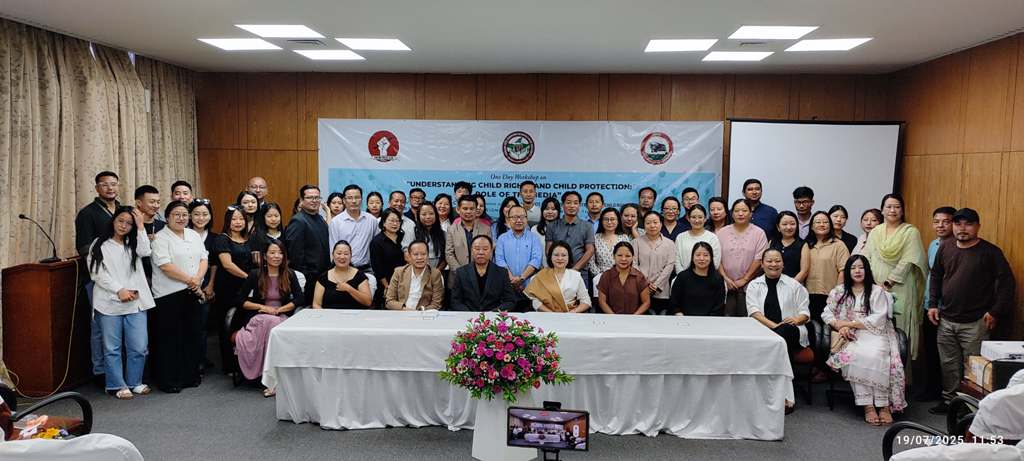The Kohima Press Club organises a one-day workshop on 'Child rights and child protection: Role of the media.’
Published on Jul 19, 2025
Share
Therieh stresses on dignity over sensationalism in child reporting

KOHIMA — A one-day workshop on 'Child rights and child protection: Role of the media’ on Saturday sensitised journalists on covering matters relating to minors and children.
The workshop, organised by the Kohima Pres Club (KPC) in collaboration with Nagaland State Commission for Protection of Child Rights (NSCPCR) was held at Hotel Japfu, Kohima.
Resource person of the day, Mezivolu T Therieh, District & Sessions Judge, Phek, and former Registrar, Supreme Court of India, emphasised that the best interest of a child should be considered while reporting on minors.
Also read: C-Edge College fresher’s week celebration concludes
Highlighting the legal rules that every journalist must follow when covering children, she said media should not reveal the identity of a child even in the remotest way. Media and news outlets must not publish child’s name or photo in sexual offence cases. Doing so would attract penalty up to six months imprisonment and fine. Media must not share or circulate child sexual abuse content even if it is for awareness, she said.
When interviewing or filming children, a written consent from guardians must be obtained and it must ensure child is not portrayed in a demeaning, exploitative or dangerous way, she added.
Therieh shared that some of the best practices for journalists/media include blurring faces, using pseudonyms, and omitting identifiers.
She advocated for using child-friendly language with focus on dignity and solutions not sensationalism while framing stories, and collaborating with legal and child rights experts for sensitive cases.
The sessions judge also briefly highlighted on the international laws and guidelines such as the UN Convention on Rights of Child (UNCRC) and UNICEF.
Alun Hangsing, Chairman of NSCPCR, stated that the main purpose of the worship is to know where to draw the line, particularly while dealing with cases relating to sexual and other abuses towards minors or children, by protecting the identity of the victim or information that may indirectly lead to knowing who the victim is.
He lamented that due to the depravity of human hearts, today there is a gradual rise of unabated crime against children which was once alien to our society, “as we become more cosmopolitan in nature, in spite of knowing that the life of every children is important as they are the backbone of the society.”
“How much are we doing in order to curb this menace? is a big question in-front of us today. As children are the biggest assets we have, it is our sole responsibility to see that they grow up in a conducive environment to develop their mental and physical health without any fear from vices against them. Only then can we transform our society to our desired future ahead”, he added.
KPC President Alice Yhoshu noted that some media outlets have been overly intrusive in reporting child-related stories, causing unintended harm to the child and their family due to irresponsible reporting.
“While the media must uphold journalistic freedom that must be preserved and promoted, it should also maintain ethical and professional responsibility when it comes to reporting children-related issues and safeguard their best interests. We must prioritise child protection, even if it means to compromise the local perception of competition for headlines, winning the audience or increasing the number of readership, viewership or followers, as one may call it, in this day and age of the social media,” she said.
Sabou Yashu, Director of Information Technology and Communication, spoke on the day’s theme with references to the relevant provisions of the Indian Information Technology Act, 2000.
He highlighted some key provisions from the act which are directly related to the protection of children in cyberspace. The sections include 66E that penalises the violation of privacy, including capturing, publishing, or transmitting images of a person’s private parts without consent. The other relevant sections are Section 67 and 67B, Section 69A, and Section 79(3) (b).
As media professionals and communicators, Yashu said the role of press is not only to amplify voices and stories, but also to safeguard the identity, dignity, and rights of children. While media coverage can be a powerful tool to raise awareness about violations of child rights, it must always be grounded in sensitivity, legality, and responsibility, he added.
Dzuvinuo Theunuo, Director of Information and Public Relations, also addressed the gathering. The workshop was a part of the yearlong celebration of the 25th anniversary of the KPC. Participants from different departments, child protection agencies also attended the programme.